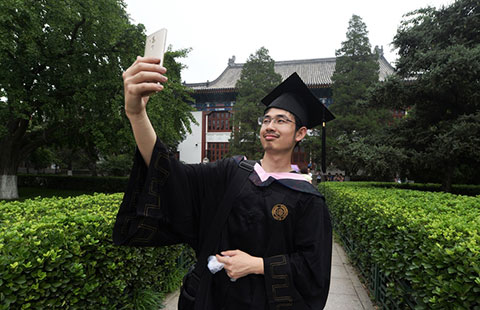Coming to roads near you: sofas that think
By Gong Zhengzheng and Li Fusheng (China Daily) Updated: 2016-06-01 06:31The US company Tesla delivered 14,820 cars in the first quarter worldwide, up about 50 percent year-on-year, and aims to deliver 80,000 to 90,000 cars this year.
New-energy vehicles are thriving in China. Nearly 91,000 new-energy vehicles were sold in the first four months of this year, 131 percent more than in the corresponding period last year, the China Association of Automobile Manufacturers says.
At the recent Beijing motor show, new-energy models accounted for more than 10 percent of all cars displayed.
Traffic authorities in Beijing say that nearly half the city's license plate quota for electric cars for this year were used up by the end of April, indicating local residents' growing acceptance of new-energy vehicles.
Public data show that major Chinese car makers have made new-energy vehicles one of their strategic objectives in the next five years, and international ones are bracing themselves to get a decent share of the market.
Matthias Muller, CEO of Volkswagen Group, says: "China will be the fastest-growing market for new-energy vehicles worldwide.
"So for us, it's crystal clear: The future of e-mobility is strongly connected to this market. In China the future is now."
Volkswagen is helping regional markets to be more responsive to customer demand and tastes, particularly those in China, where 15 new locally produced new-energy vehicles will be rolled out by 2020.
Another thing that car makers agree on is the necessity of onboard connectivity, which they say will alter the automotive industry.
"If the automotive industry does not want to run the risk of having its status downgraded to that of a hardware supplier, we have to make sure we take advantage of the big technological trends ourselves," Muller says.
William Li, founder of NextEv, a Chinese startup aspiring to make electric and smart supercars, says connectivity is something carmakers have to provide to meet the demands of a customer base that grew up in the age of the internet.
Harald Krueger, chairman of the board of management of BMW AG, says: "Our technologies will learn to learn from people. And connectivity is becoming second nature.
"In China the share of post-90s in the Chinese car market was 15 percent last year and this will increase to 45 percent in 2025. In other words the next generation of customers were born into the digital age. Technology is becoming human.
"The best way to predict the future is to shape it."
- Flight-tests check routes to Nansha airfields
- Premier to set new course in Mongolia
- Copyright violators to be placed on blacklist
- Car-hailing firm bans mentally ill, criminals from driving
- Calling it quits: Divorce rate jumps 6%
- More rain to create Yangtze flood control pressure
- China condemns S Sudan attack that killed 2 peacekeepers
- National digital platform set up for volunteer services
- Typhoon Nepartak leaves six dead, eight missing in east China
- Fifth lighthouse to shine on S China Sea










